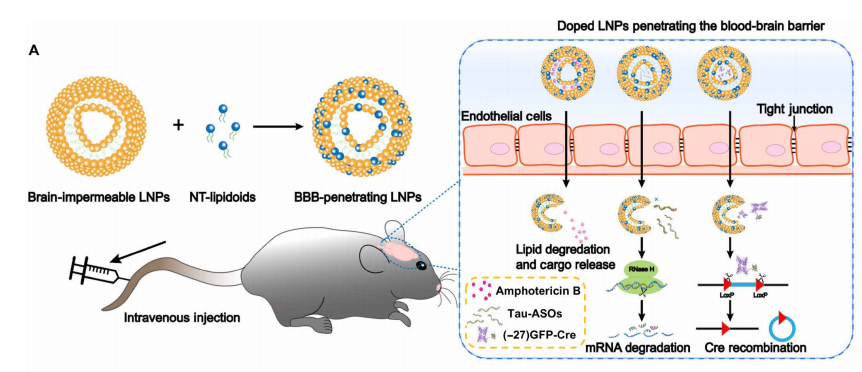Biomedical engineers at the Tufts University School of Engineering have developed tiny lipid-based nanoparticles that incorporate neurotranmitters to help carry drugs, large molecules, and even gene editing proteins across the blood-brain barrier and into the brain in mice.
We can deliver a wide range of molecules by packaging them into the lipid-based nanonparticles without chemically modifying the drugs themselves. We can also achieve delivery across the blood-brain barrier without disrupting the integrity of the barrier."
Current approaches, such as direct injection or disruption of the barrier to make it "leaky," are fraught with risks, including infection, tissue damage and neurotoxicity. The use of carriers, such as modified viruses and monoclonal antibodies to ferry cargo into the brain, has limitations, including production cost and safety. Other carriers, such as nanoparticles, nanocapsules and polymers, have shown promise but the modifications required to ensure delivery can be complicated.
The Tufts researchers found that the addition of the NT-lipidoid to many varieties of LNPs can render them permeable to the blood-brain barrier. That means that LNPs can be optimized for lipid length and ratios to package drugs of different types, from small molecules to DNA to large enzyme complexes, and then provided the same blood-brain barrier permeability by addition of the NT-lipidoid.

reference
Neurotransmitter-derived lipidoids (NT-lipidoids) for enhanced brain delivery through intravenous injection, Science Advances 2020 July 24. DOI: 10.1126/sciadv.abb4429
'medical engineering' 카테고리의 다른 글
| hydrogel-solid bonding (0) | 2020.08.04 |
|---|---|
| drawn on skin sensor (0) | 2020.08.03 |
| saliva based COVID-19 detection (0) | 2020.07.30 |
| thread based wearable sensor (0) | 2020.07.29 |
| Neuron mechanical stimulation through Nano-magnetic particle (0) | 2020.07.23 |



